from Feb. 12, 1909
Francisco Perea Recollections of Lincoln Assassination
-
Full Title
Mr. Lincoln Was Always Intensely Interested in Affairs of New Mexico
-
Description
This article features an interview with Francisco Perea, a former member of the House of Representatives from the territory of New Mexico during the Civil War. Perea was present at Ford's Theatre on the night of the assassination, and in this interview he recounts his experiences and the changes he saw in the atmosphere of Washington and it's residents. Perea was also familiar with President Lincoln before the assassination and reflects fondly on their personal and business relations prior to his death.
-
Source
-
Rights
This item is in the public domain and may be reproduced and used for any purpose, including research, teaching, private study, publication, broadcast or commercial use, with proper citation and attribution.
-
Tags
-
Cite this Item
Albuquerque Morning Journal. "Mr. Lincoln Was Always Intensely Interested in Affairs of New Mexico". Library of Congress. Remembering Lincoln. Web. Accessed June 30, 2025. https://rememberinglincoln.fords.org/node/1202
-
Creator
Albuquerque Morning Journal
-
Publisher
Library of Congress
-
Date
February 12, 1909
from Feb. 12, 1909
Mr. Lincoln Was Always Intensely Interested in Affairs of New Mexico
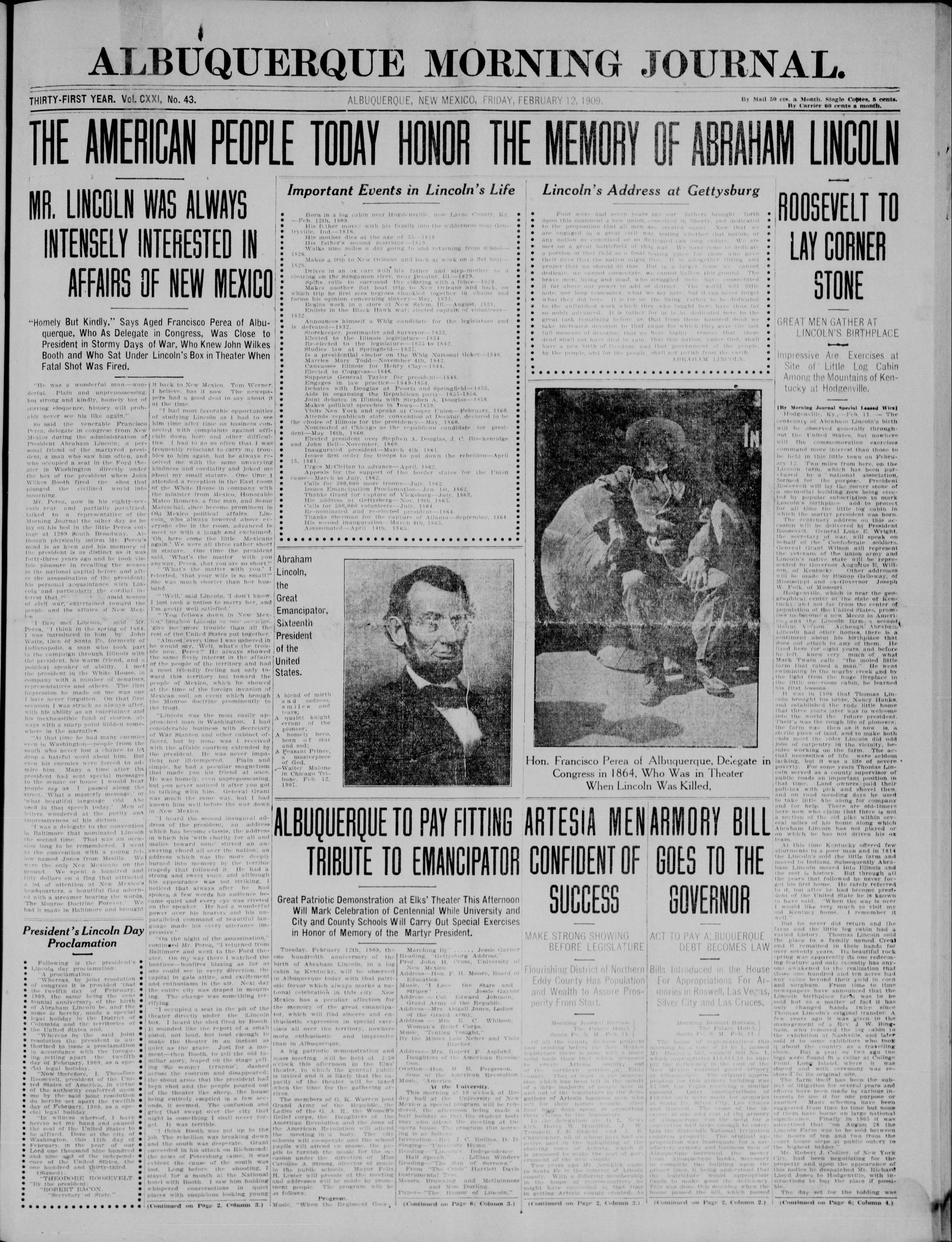
-
Description
This article features an interview with Francisco Perea, a former member of the House of Representatives from the territory of New Mexico during the Civil War. Perea was present at Ford's Theatre on the night of the assassination, and in this interview he recounts his experiences and the changes he saw in the atmosphere of Washington and it's residents. Perea was also familiar with President Lincoln before the assassination and reflects fondly on their personal and business relations prior to his death.
-
Source
-
Rights
This item is in the public domain and may be reproduced and used for any purpose, including research, teaching, private study, publication, broadcast or commercial use, with proper citation and attribution.
-
Creator
Albuquerque Morning Journal
-
Publisher
Library of Congress
-
Date
February 12, 1909
from Jul. 16, 1865
John Bigelow Diary Entry
-
Full Title
John Bigelow Diary Entry
-
Description
John Bigelow was an American author, editor and diplomat. In 186, Abraham Lincoln appointed Bigelow as United States Consul becoming Chargé d'Affaires at Paris, France, as Minister to the Court of Napoleon III. In 1865, he was appointed American Ambassador to France. He sporadically kept a diary during this time and following a months long gap beginning in early April 1865. He returned to writing in July and notes the greatest change over the last few months being the Lincoln assassination.
-
Transcription
“John Bigelow Diary Entry”
Sunday July 16^[[th]]. 1865. 81
It is now the months & more since I have touched my
journal and what an inconsistency on my hart, The
three most eventful months of my life. I have elected
into my [[functions]] [[hae]] as Minister Plen; Prest. Lincoln had
been assassinated ; a man who If me or you [[best guess]] had followed
a dispace to the country , and as Vice Prest. a national ealamily
has becomes President ; this man is now generally
believed to be a much more competent President
for the coming emergencies ; The war is ended and
the rebels are coming in by hundreds to make them
reach with the [[good]]. all satisfied That they had made
a great mistake; Ms. Bigelow has gone home
on a visit with Jenny, I have father Mario [[dfrise`s]] hotel
in the Rue des [[Ballims]] 91°19 at 21000 for a year, hace
ordered [[Bander]] to make me a [[Berfine]] and to repair
my Coupé at an aggregate expense of who boosts, and
last might accepted [[F Asterach]] proportional to find
me a fine than of horses which he says he wil
be glad to do at a bargain out of gratitude.
[Transcription by: Alexis Ennis, Rachel Engl’s class, Lehigh University.] -
Source
Manuscripts and Archives Division, The New York Public Library
-
Rights
This item is in the public domain and may be reproduced and used for any purpose, including research, teaching, private study, publication, broadcast or commercial use, with proper citation and attribution.
-
Tags
-
Cite this Item
John Bigelow. "John Bigelow Diary Entry". Remembering Lincoln. Web. Accessed June 30, 2025. https://rememberinglincoln.fords.org/node/1190
-
Creator
John Bigelow
-
Date
July 16, 1865
from Jul. 16, 1865
John Bigelow Diary Entry
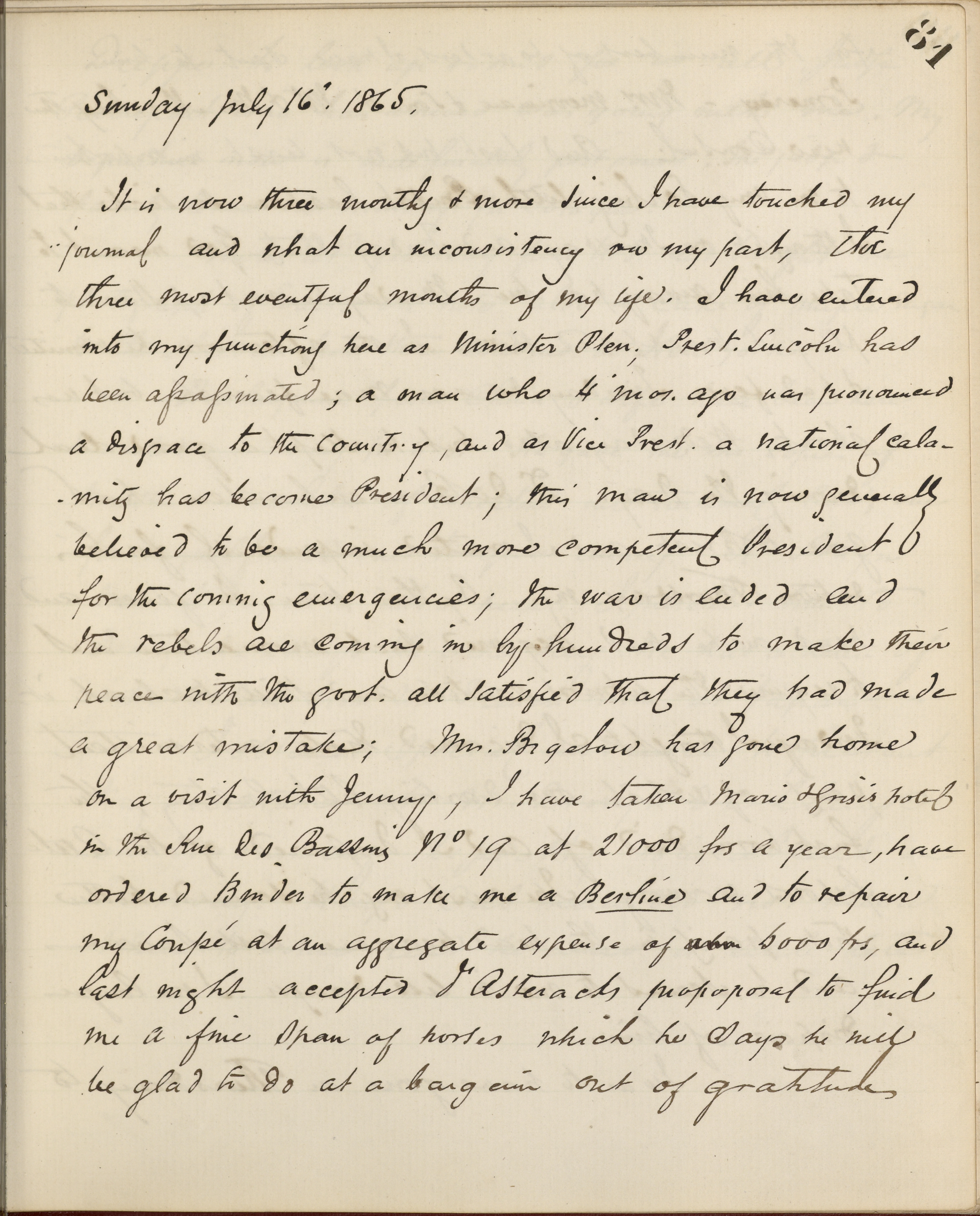
-
Description
John Bigelow was an American author, editor and diplomat. In 186, Abraham Lincoln appointed Bigelow as United States Consul becoming Chargé d'Affaires at Paris, France, as Minister to the Court of Napoleon III. In 1865, he was appointed American Ambassador to France. He sporadically kept a diary during this time and following a months long gap beginning in early April 1865. He returned to writing in July and notes the greatest change over the last few months being the Lincoln assassination.
-
Source
Manuscripts and Archives Division, The New York Public Library
-
Rights
This item is in the public domain and may be reproduced and used for any purpose, including research, teaching, private study, publication, broadcast or commercial use, with proper citation and attribution.
-
Creator
John Bigelow
-
Date
July 16, 1865
from Jan. 9, 1866
A Speech on "Equality Before the Law"
-
Full Title
A Speech on "Equality Before the Law" Delivered by J. Mercer Langston In the Hall of Representatives in the Capitol of Missouri
-
Description
In this pamphlet put together by the Missouri State Executive Committee, a speech delivered by John Mercer Langston on January 9th, 1866 called for political emancipation for African Americans. Also within this pamphlet, an address by the Colored People of Missouri to the Friends of Equal Rights strived to make manhood, not color, the basis of suffrage and thanked God for using President Lincoln to emancipate African American slaves.
-
Source
-
Rights
This item is in the public domain and may be reproduced and used for any purpose, including research, teaching, private study, publication, broadcast or commercial use, with proper citation and attribution.
-
Tags
-
Cite this Item
Missouri State Executive Committee. "A Speech on "Equality Before the Law" Delivered by J. Mercer Langston In the Hall of Representatives in the Capitol of Missouri". Democrat Book and Job Printing House. Remembering Lincoln. Web. Accessed June 30, 2025. https://rememberinglincoln.fords.org/node/1129
-
Creator
Missouri State Executive Committee
-
Publisher
Democrat Book and Job Printing House
-
Date
January 9, 1866
from Jan. 9, 1866
A Speech on "Equality Before the Law" Delivered by J. Mercer Langston In the Hall of Representatives in the Capitol of Missouri
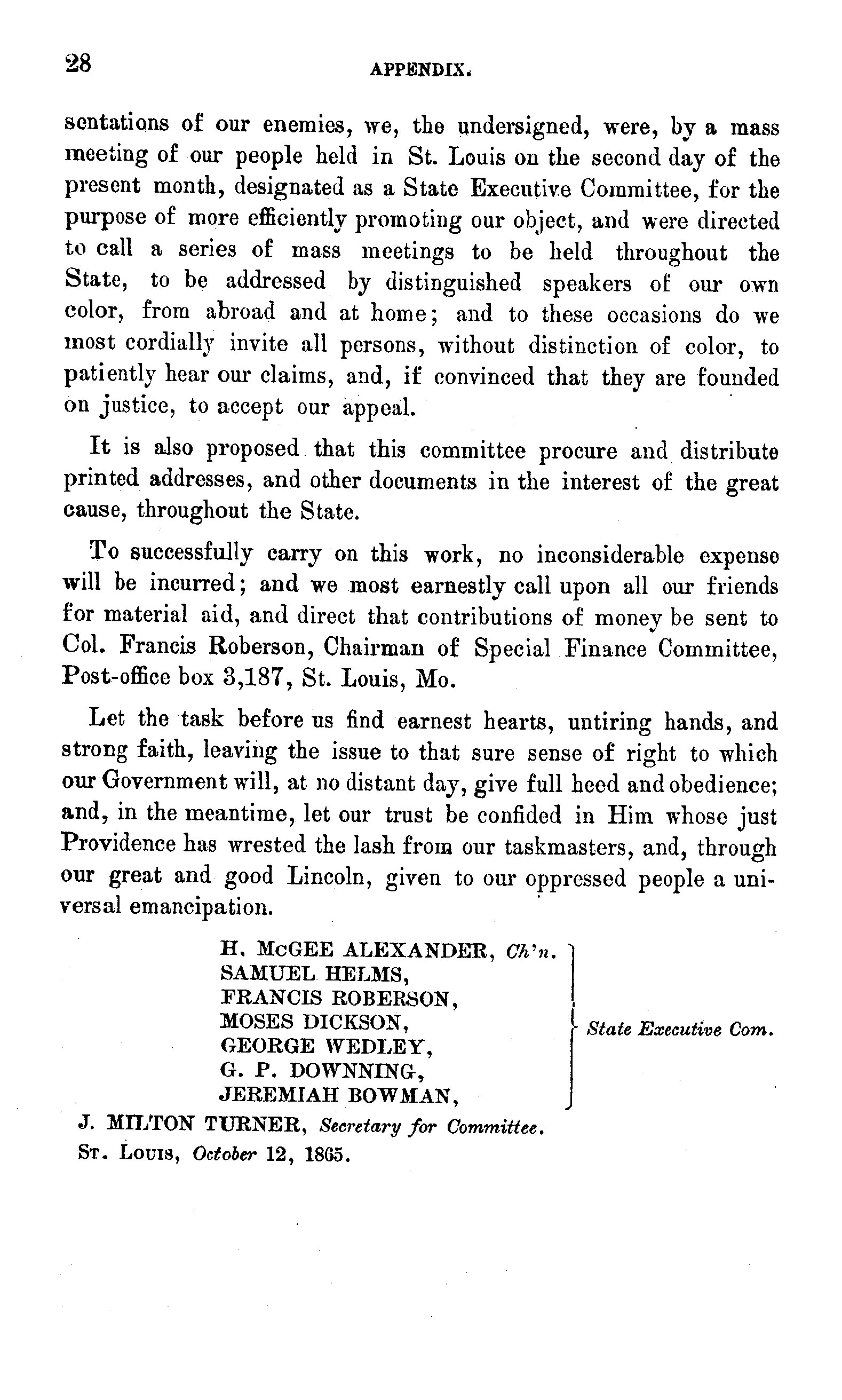
-
Description
In this pamphlet put together by the Missouri State Executive Committee, a speech delivered by John Mercer Langston on January 9th, 1866 called for political emancipation for African Americans. Also within this pamphlet, an address by the Colored People of Missouri to the Friends of Equal Rights strived to make manhood, not color, the basis of suffrage and thanked God for using President Lincoln to emancipate African American slaves.
-
Source
-
Rights
This item is in the public domain and may be reproduced and used for any purpose, including research, teaching, private study, publication, broadcast or commercial use, with proper citation and attribution.
-
Creator
Missouri State Executive Committee
-
Publisher
Democrat Book and Job Printing House
-
Date
January 9, 1866
from Apr. 14, 1865
Diary of Orville Hickman Browning
-
Full Title
Diary of Orville Hickman Browning, Friend of Lincoln - Excerpts from April 14-19, 1865
-
Description
These are the diary entries of former U.S. Senator and friend of President Lincoln, Orville Hickman Browning, the day of Lincoln's assassination up to the funeral in Washington, DC on April 19, 1865. Browning discusses how he heard about the attacks and incorrectly states the Secretary of State Seward was killed. He talks about how Lincoln was the South's best ally within the government and speculates who the attacker was. Over the next few days he visits the White House and describes the body of the fallen president. These excerpts are part of the “Diary of Orville Hickman Browning Volume II: 1865-1881,” published in 1925 by the Illinois State Historical Library. Born in Kentucky in 1806, Browning moved to Quincy, Illinois to become a lawyer. Later he served as a U.S. Senator, adviser to Abraham Lincoln and Andrew Johnson, and even a cabinet minister. Browning and Lincoln became friends while serving in the state legislature; both were members of the Whig party. Browning served as an ally for Lincoln during his presidency.
-
Source
Hathi Trust Digital Library
-
Rights
The written permission of the copyright owners and/or other rights holders (such as publicity and/or privacy rights) is required for distribution, reproduction, or other use of protected items beyond that allowed by fair use or other statutory exemptions.
-
Tags
-
Cite this Item
Orville Hickman Browning. "Diary of Orville Hickman Browning, Friend of Lincoln - Excerpts from April 14-19, 1865". Illinois State Historical Library. Remembering Lincoln. Web. Accessed June 30, 2025. https://rememberinglincoln.fords.org/node/1098
-
Creator
Orville Hickman Browning
-
Publisher
Illinois State Historical Library
-
Date
April 14, 1865
-
Dimensions
22 cm.
from Apr. 14, 1865
Diary of Orville Hickman Browning, Friend of Lincoln - Excerpts from April 14-19, 1865
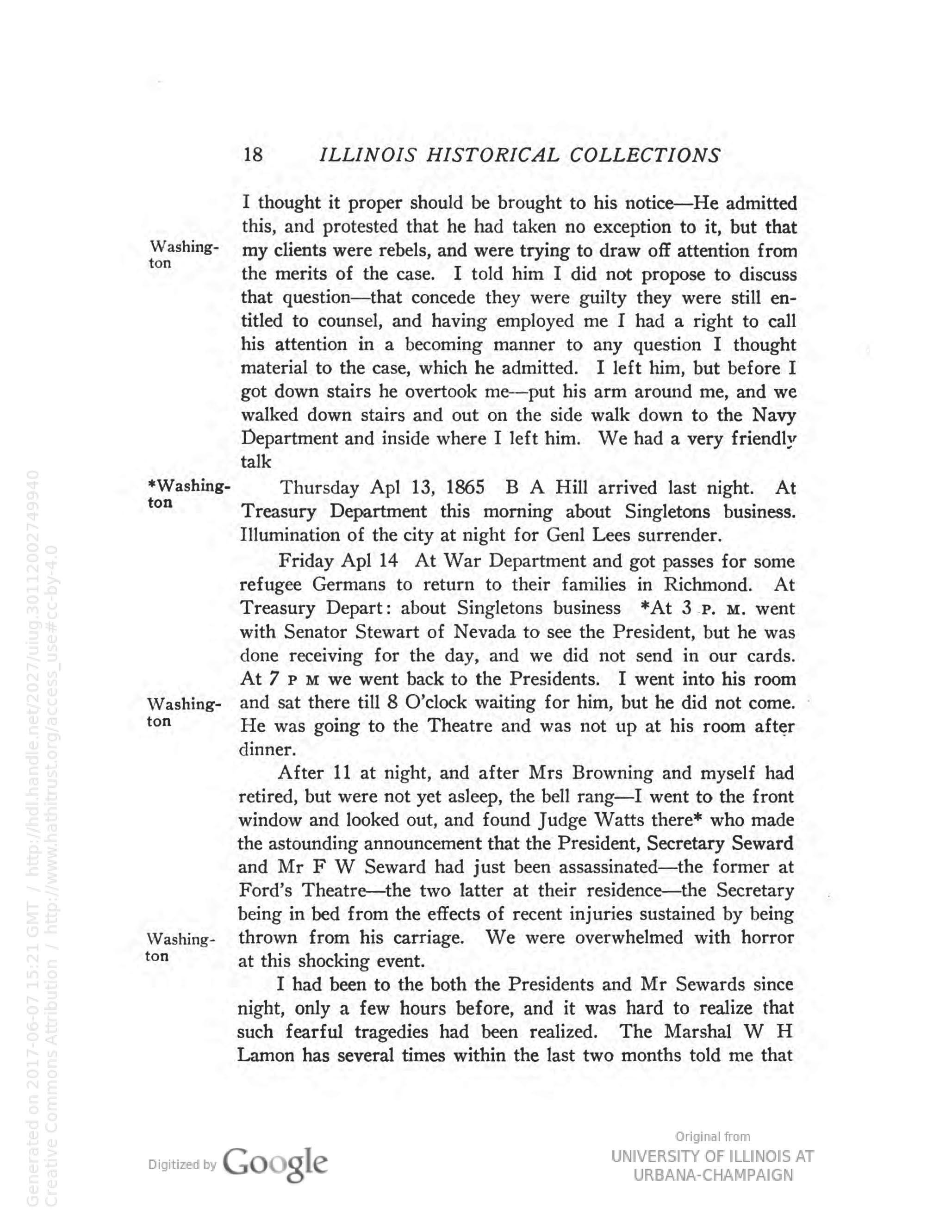
-
Description
These are the diary entries of former U.S. Senator and friend of President Lincoln, Orville Hickman Browning, the day of Lincoln's assassination up to the funeral in Washington, DC on April 19, 1865. Browning discusses how he heard about the attacks and incorrectly states the Secretary of State Seward was killed. He talks about how Lincoln was the South's best ally within the government and speculates who the attacker was. Over the next few days he visits the White House and describes the body of the fallen president. These excerpts are part of the “Diary of Orville Hickman Browning Volume II: 1865-1881,” published in 1925 by the Illinois State Historical Library. Born in Kentucky in 1806, Browning moved to Quincy, Illinois to become a lawyer. Later he served as a U.S. Senator, adviser to Abraham Lincoln and Andrew Johnson, and even a cabinet minister. Browning and Lincoln became friends while serving in the state legislature; both were members of the Whig party. Browning served as an ally for Lincoln during his presidency.
-
Source
Hathi Trust Digital Library
-
Rights
The written permission of the copyright owners and/or other rights holders (such as publicity and/or privacy rights) is required for distribution, reproduction, or other use of protected items beyond that allowed by fair use or other statutory exemptions.
-
Creator
Orville Hickman Browning
-
Publisher
Illinois State Historical Library
-
Date
April 14, 1865
-
Dimensions
22 cm.
from Feb. 14, 1866
Regarding the Death of Abraham Lincoln, Arizona Miner
-
Full Title
Regarding the Death of Abraham Lincoln, Arizona Miner
-
Description
The Arizona House of Representatives, President of the Council and the Assistant Secretary of the Arizona Territory signed a resolution as a formal expression of regret for the death of President Abraham Lincoln in February 1866. This article is an official recording of the opinion of the people of Arizona almost a year after the event. A copy of the resolution was sent to President Lincoln's family and was published in the Arizona Miner newspaper as well as other journals of the Pacific and Atlantic States. Originally established as a Republican newspaper in 1864 by Territorial Secretary Richard McCormick (nominated by President Lincoln in 1863), the publication grew to become very politically partisan when racist Democrat John H. Marion took over as editor in 1867. Arizona became a state in 1912.
-
Transcription
Regarding the death of Abraham Lincoln.
WHEREAS, There has been, to this time, no formal expression of regret on the part of the people of Arizona over the untimely and lamentable death of Abraham Lincoln, the sixteenth President of the United States; therefore
Resolved, By the House of Representatives, the Council concurring, That we record our abhorrence of the dastardly act which deprived the nation of the valuable life of Abraham Lincoln, when his great statesmanship and noble character had won the confidence and applause of the civilized world, and the wisdom of his administration of public affairs, at the most critical period in the life of the American people, was universally conceded.
Resolved, That here where civil law was first established by the generous consideration of his administration, as elsewhere upon the continent, which owes so much to his honest and persistent devotion to liberty to justice and to the government of the people, his name is honored and revered as that of a true patriot, a profound ruler, and a magnanimous and unselfish man, whose highest motive was the public good, and whose consistent career has elevated the dignity, brightened the renown, and enriched the history of the Republic.
Resolved, That a copy of these resolutions be forwarded to the family of the illustrious dead, and to the present President of the United States, also that they be published in the ARIZONA MINER, and in the principal journals of the Pacific and Atlantic States.
JAMES S. GILES,
Speaker of the House of Representatives.
HENRY A. BIGELOW,
President of the Council.
A true copy of the original on file in my office.
HENRY W. FLEURY,
Assistant Secretary of the Territory.
[Transcription by: Ricarda H., Dr. Susan Corbesero’s Class, Ellis School, Pittsburgh, Pennsylvania] -
Source
Library of Congress Chronicling America
-
Rights
This item is in the public domain and may be reproduced and used for any purpose, including research, teaching, private study, publication, broadcast or commercial use, with proper citation and attribution.
-
Tags
-
Cite this Item
Fort Whipple Arizona Miner. "Regarding the Death of Abraham Lincoln, Arizona Miner". Tisdale A. Hand. Remembering Lincoln. Web. Accessed June 30, 2025. https://rememberinglincoln.fords.org/node/1096
-
Creator
Fort Whipple Arizona Miner
-
Publisher
Tisdale A. Hand
-
Date
February 14, 1866
from Feb. 14, 1866
Regarding the Death of Abraham Lincoln, Arizona Miner

-
Description
The Arizona House of Representatives, President of the Council and the Assistant Secretary of the Arizona Territory signed a resolution as a formal expression of regret for the death of President Abraham Lincoln in February 1866. This article is an official recording of the opinion of the people of Arizona almost a year after the event. A copy of the resolution was sent to President Lincoln's family and was published in the Arizona Miner newspaper as well as other journals of the Pacific and Atlantic States. Originally established as a Republican newspaper in 1864 by Territorial Secretary Richard McCormick (nominated by President Lincoln in 1863), the publication grew to become very politically partisan when racist Democrat John H. Marion took over as editor in 1867. Arizona became a state in 1912.
-
Source
Library of Congress Chronicling America
-
Rights
This item is in the public domain and may be reproduced and used for any purpose, including research, teaching, private study, publication, broadcast or commercial use, with proper citation and attribution.
-
Creator
Fort Whipple Arizona Miner
-
Publisher
Tisdale A. Hand
-
Date
February 14, 1866
from Apr. 15, 1865
A Proclamation by Rhode Island Governor
-
Full Title
A Proclamation by James Youngs Smith, Governor of the State of Rhode Island
-
Description
James Youngs Smith, the 29th Governor of Rhode Island, issued a proclamation on the day of Abraham Lincoln's assassination asking the clergy of Rhode Island to commemorate the President and pray for the country during the upcoming Sunday services. Born in Groton, Connecticut in 1809, Smith moved to Providence, Rhode Island at the age of 16 to work for a lumber business. Later in life he bought mills in both Connecticut and Rhode Island. He served three terms as Governor of Rhode Island as a Republican before declining to run for a fourth term. He served throughout the Civil War and was able to fill the state's troop quota through voluntary enlistment because the citizens of Rhode Island opposed drafting soldiers. Smith married Emily Brown, the daughter of a cotton manufacturer from Massachusetts and had three children.
-
Source
Library of Congress, Rare Book And Special Collections Division
-
Rights
Transmission or reproduction of protected items beyond that allowed by fair use requires the written permission of the copyright owners.
-
Tags
-
Cite this Item
James Y. Smith. "A Proclamation by James Youngs Smith, Governor of the State of Rhode Island". Rhode Island, Governor. Remembering Lincoln. Web. Accessed June 30, 2025. https://rememberinglincoln.fords.org/node/1093
-
Creator
James Y. Smith
-
Publisher
Rhode Island, Governor
-
Date
April 15, 1865
-
Material
Printed on page [1] of a single-folded sheet.
-
Dimensions
21 cm.
from Apr. 15, 1865
A Proclamation by James Youngs Smith, Governor of the State of Rhode Island
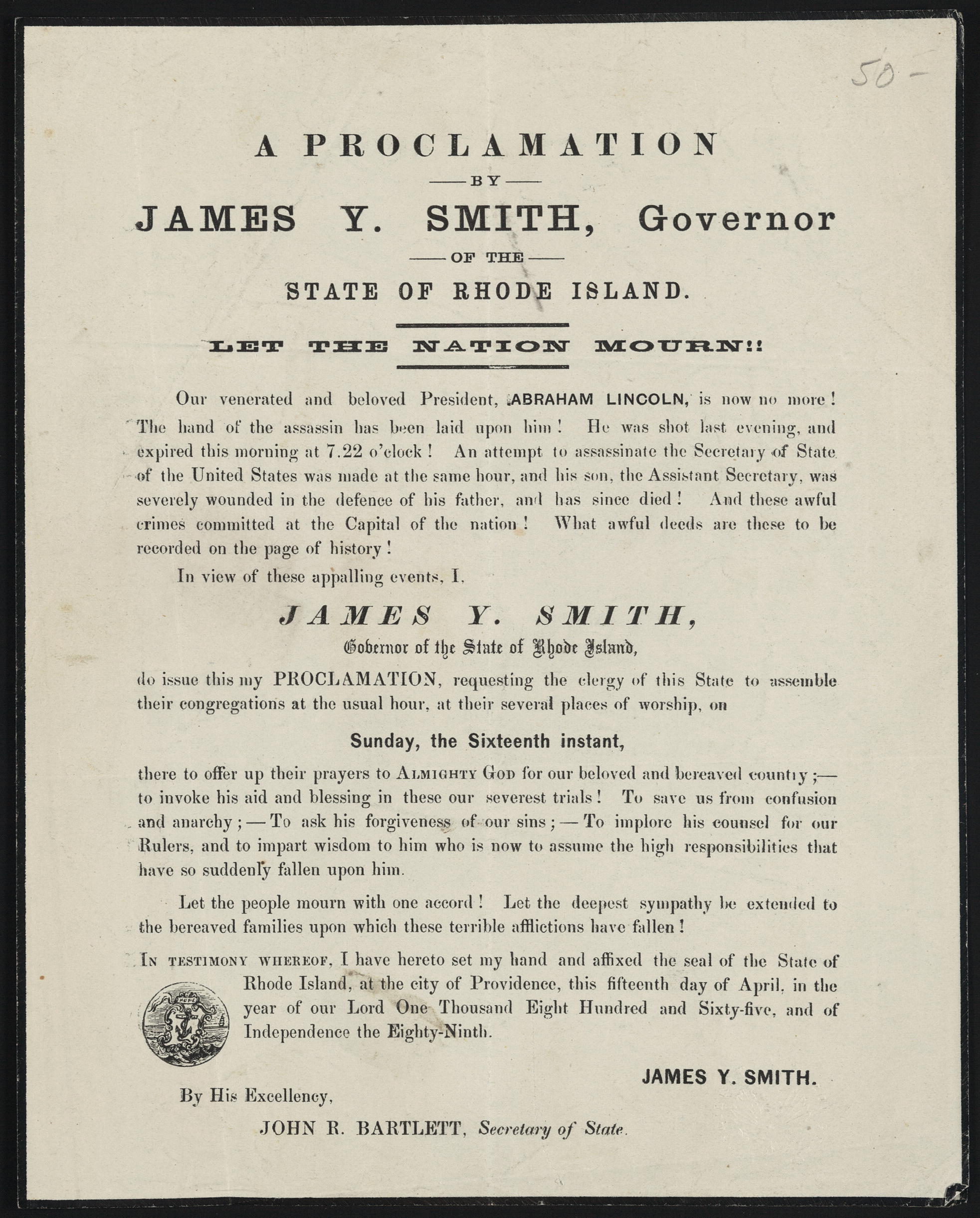
-
Description
James Youngs Smith, the 29th Governor of Rhode Island, issued a proclamation on the day of Abraham Lincoln's assassination asking the clergy of Rhode Island to commemorate the President and pray for the country during the upcoming Sunday services. Born in Groton, Connecticut in 1809, Smith moved to Providence, Rhode Island at the age of 16 to work for a lumber business. Later in life he bought mills in both Connecticut and Rhode Island. He served three terms as Governor of Rhode Island as a Republican before declining to run for a fourth term. He served throughout the Civil War and was able to fill the state's troop quota through voluntary enlistment because the citizens of Rhode Island opposed drafting soldiers. Smith married Emily Brown, the daughter of a cotton manufacturer from Massachusetts and had three children.
-
Source
Library of Congress, Rare Book And Special Collections Division
-
Rights
Transmission or reproduction of protected items beyond that allowed by fair use requires the written permission of the copyright owners.
-
Creator
James Y. Smith
-
Publisher
Rhode Island, Governor
-
Date
April 15, 1865
-
Material
Printed on page [1] of a single-folded sheet.
-
Dimensions
21 cm.
from May. 1, 1865
The Governor of Wisconsin's Proclamation
-
Full Title
The Governor of Wisconsin's Proclamation
-
Description
Among the various articles on the surrender of Confederate armies, Jefferson Davis, and reactions from around the country on the death of President Lincoln, there is one in particular that stands out. In the top right corner, Governor James T. Lewis makes known the people of Wisconsin of how they should respond in the wake of Lincoln's death. The people of Wisconsin, in accord with Lincoln's family, should remain in a state of mourning for a hundred days. This meant that local businesses and public buildings should be adorned in black, as well as a proclamation for a day of fasting and prayer on April 19, 1865. In remembrance of Lincoln, Lewis declares that all funerals and ceremonies should include full military honors. The short article ends with a showing of Union pride, as Lewis calls for the full backing of President Johnson's administration.
-
Source
Gale Group: 19th Century U.S. Newspapers Database
-
Rights
This item is in the public domain and may be reproduced and used for any purpose, including research, teaching, private study, publication, broadcast or commercial use, with proper citation and attribution.
-
Tags
-
Cite this Item
Governor James T. Lewis. "The Governor of Wisconsin's Proclamation ". Milwaukee Daily Sentinel. Remembering Lincoln. Web. Accessed June 30, 2025. https://rememberinglincoln.fords.org/node/928
from May. 1, 1865
The Governor of Wisconsin's Proclamation
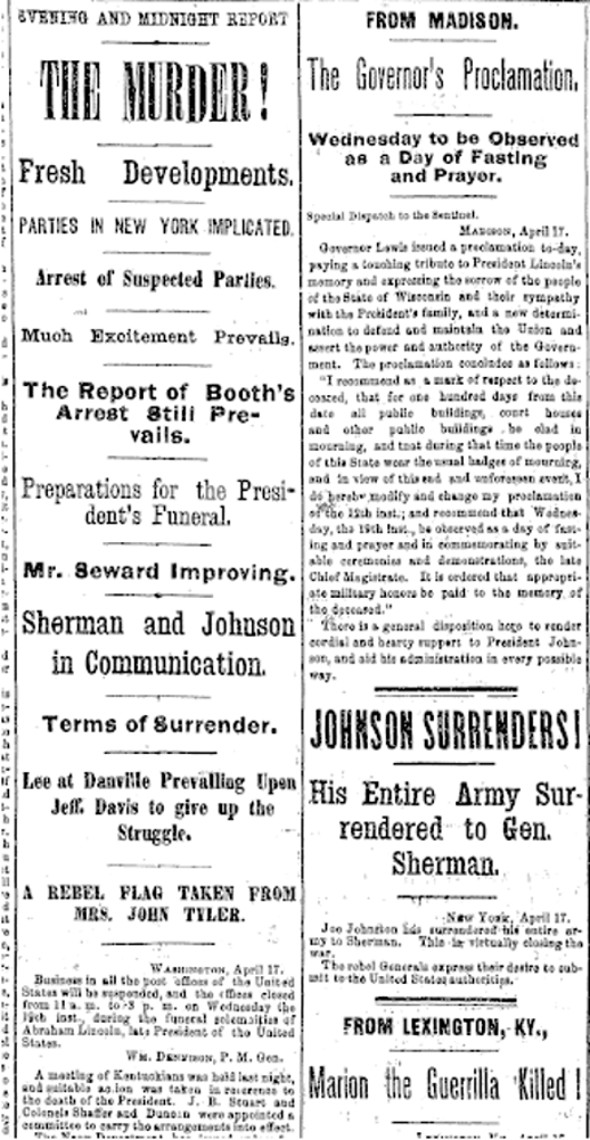
-
Description
Among the various articles on the surrender of Confederate armies, Jefferson Davis, and reactions from around the country on the death of President Lincoln, there is one in particular that stands out. In the top right corner, Governor James T. Lewis makes known the people of Wisconsin of how they should respond in the wake of Lincoln's death. The people of Wisconsin, in accord with Lincoln's family, should remain in a state of mourning for a hundred days. This meant that local businesses and public buildings should be adorned in black, as well as a proclamation for a day of fasting and prayer on April 19, 1865. In remembrance of Lincoln, Lewis declares that all funerals and ceremonies should include full military honors. The short article ends with a showing of Union pride, as Lewis calls for the full backing of President Johnson's administration.
-
Source
Gale Group: 19th Century U.S. Newspapers Database
-
Rights
This item is in the public domain and may be reproduced and used for any purpose, including research, teaching, private study, publication, broadcast or commercial use, with proper citation and attribution.
-
Creator
Governor James T. Lewis
-
Publisher
Milwaukee Daily Sentinel
-
Date
May 1, 1865
from Sep. 9, 2015
Oliver to Tom Dunks
-
Full Title
Dunks Family Correspondence
-
Description
Oliver Dunks tells his brother, Tom, that he just attended the eulogy of President Lincoln at the Congregational Church in Detroit (most likely the church located at the corner of Fort St. and Wayne St.). He briefly describes the visual displays of mourning in the church and the city and concludes by observing that the country seems to be just as, if not more sorrowful for the death of Lincoln than they were for that of President George Washington.
-
Transcription
Detroit Apl 19 / 65
Dear Brother Tom
Your welcome
letter of the 17th just recd glad
to hear from you The loss
that you refer to that our
Nation has suffered is irreparable
shocking to think of but it
showes how he posesed the affections
of the hearts of the people I have
just been over to his funeral
at or eulogy at the Congrega
-tional Church the regular
funeral is to be next Tuesday
th City is draped in mourn
ing and has been from
the the time of hearing the
inteligence our Church was
draped clear around also and
all the front of the pulpet
I think that our country
mourned no more for
Washington than they have &
will for Father Abraham
I sent those pens this morn
and will enclose Bill
cost $66. you can sell them
in any shape that you can
holders or pens Chas had no
medium. Pens with Silver Holders
but will soon Sib is to be
married tomorrow morning
at Nine oClock I am invited
there is to be only the family
Henry has got back I have
just noticed that you say
that you will not go to
Coldwater until Monday
well all right I believe that
I would try awhile in
Coldwater I have not found
a Situation yet Please write soon
Your Brother
Oliver. S. Dunks
-
Source
c.00123 - Dunks Family Correspondence
-
Rights
Educational use only, no other permissions given. Copyright to this resource is held by Michigan State University and is provided here for educational purposes only. It may not be reproduced or distributed in any format without written permission of the University Archives & Historical Collections, Michigan State University.
-
Tags
-
Cite this Item
Oliver S. Dunks. "Dunks Family Correspondence ". Michigan State University Archives & Historical Collections. Remembering Lincoln. Web. Accessed June 30, 2025. https://rememberinglincoln.fords.org/node/860
-
Creator
Oliver S. Dunks
-
Publisher
Michigan State University Archives & Historical Collections
-
Date
April 19, 1865
-
Material
Ink and Paper
-
Dimensions
5" x 8"
from Sep. 9, 2015
Dunks Family Correspondence
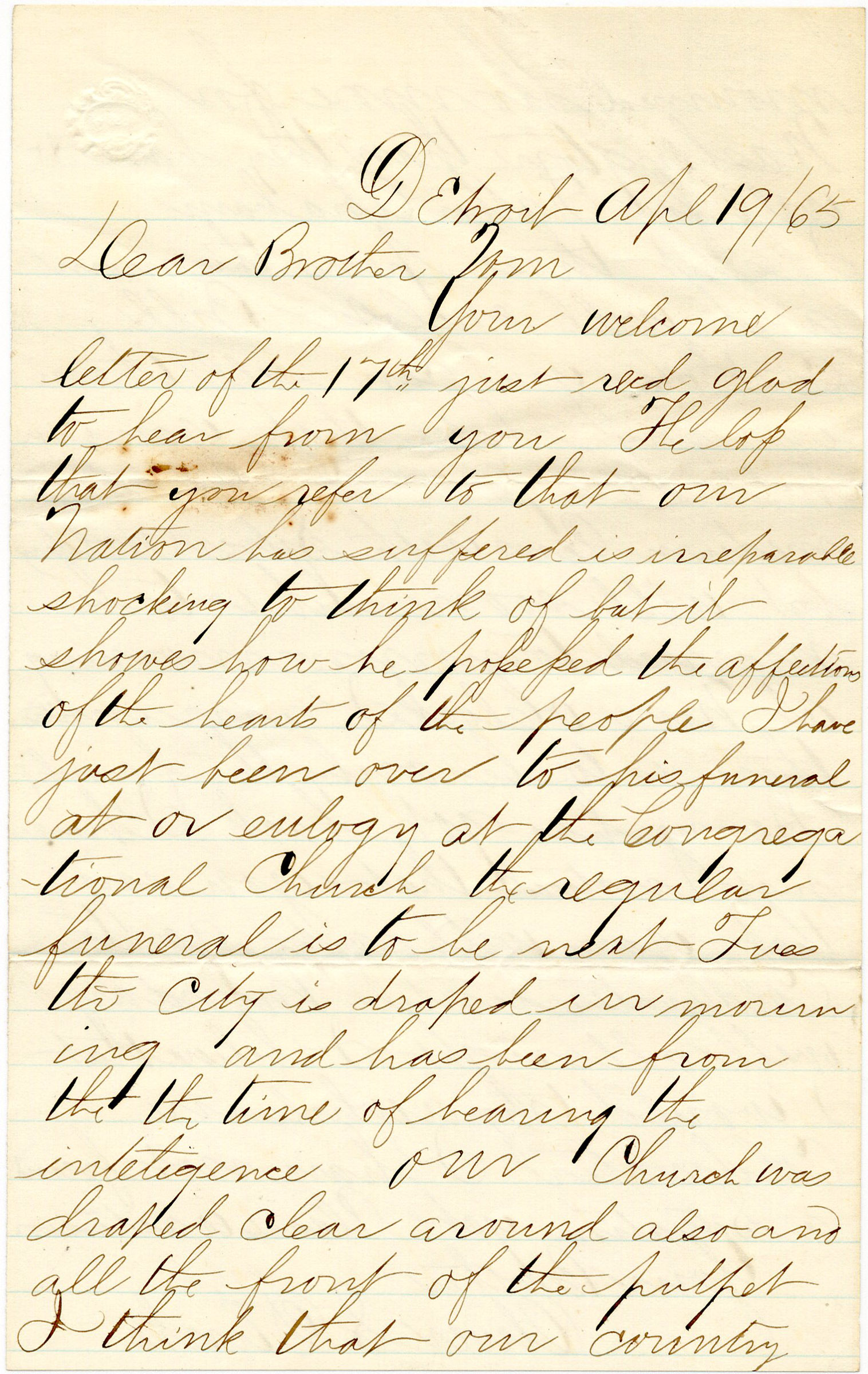
-
Description
Oliver Dunks tells his brother, Tom, that he just attended the eulogy of President Lincoln at the Congregational Church in Detroit (most likely the church located at the corner of Fort St. and Wayne St.). He briefly describes the visual displays of mourning in the church and the city and concludes by observing that the country seems to be just as, if not more sorrowful for the death of Lincoln than they were for that of President George Washington.
-
Source
c.00123 - Dunks Family Correspondence
-
Rights
Educational use only, no other permissions given. Copyright to this resource is held by Michigan State University and is provided here for educational purposes only. It may not be reproduced or distributed in any format without written permission of the University Archives & Historical Collections, Michigan State University.
-
Creator
Oliver S. Dunks
-
Publisher
Michigan State University Archives & Historical Collections
-
Date
September 9, 2015
-
Material
Ink and Paper
-
Dimensions
5" x 8"
from Dec. 15, 1865
Abraham Lincoln, a Speech
-
Full Title
Abraham Lincoln, a Speech
-
Description
In this speech, Frederick Douglass reflected on how the outpouring of joy at the conclusion of the Civil War turned to mourning with Lincoln’s assassination. His death, according to Douglass was not only tragic, but also prevented recently freed slaves and African Americans from gaining the ear of wise and well-intentioned leader. Towards the end of his speech, Douglass pondered how life would have been different had Lincoln not perished in April, lamenting that his death was a great blow against African American rights.
-
Transcription
Colored men, first to the brave Colored Soldiers who had fought under our flag and second to the very intelligent part of the Colored population South. This declaration on his part though it seemed to mean but little meant a great deal. It was like Abraham Lincoln. He never shocked prejudices unnecessarily. Having learned Statesmanship while splitting rails, he always used the thin edge of the wedge first, and the fact that he used this at all meant that he would if need be, use the thick as well as the thin. He saw the absurdity of asking men to fight for a Government which should degrade them, and the meanness of enfranchising enemies and de-franchising friends. He was a progressive man, a humane man, an honorable man, and at heart an antislavery man. He had exhausted the resources of conciliation upon rebels and slaveholders and now looked to the principles of Liberty and justice, for the peace, security, happiness and prosperity of his Country. I assume therefore, had Abraham Lincoln been spared to see this day, the negro of the South would have more than a hope of enfranchisement and no rebels could hold the reins of Government in any one of the late rebellious States. Whosoever else have cause to mourn the loss of Abraham Lincoln, to the Colored people of the Country his death is an unspeakable calamity.
[Transcription by: Evan Laugen, Chandra Manning's class, Georgetown University]. -
Source
Frederick Douglass Papers, Manuscript Division, Library of Congress
-
Rights
This item is in the public domain and may be reproduced and used for any purpose, including research, teaching, private study, publication, broadcast or commercial use, with proper citation and attribution.
-
Tags
-
Cite this Item
Frederick Douglass. "Abraham Lincoln, a Speech". Remembering Lincoln. Web. Accessed June 30, 2025. https://rememberinglincoln.fords.org/node/812
-
Creator
Frederick Douglass
-
Date
Late December 1865
from Dec. 15, 1865
Abraham Lincoln, a Speech
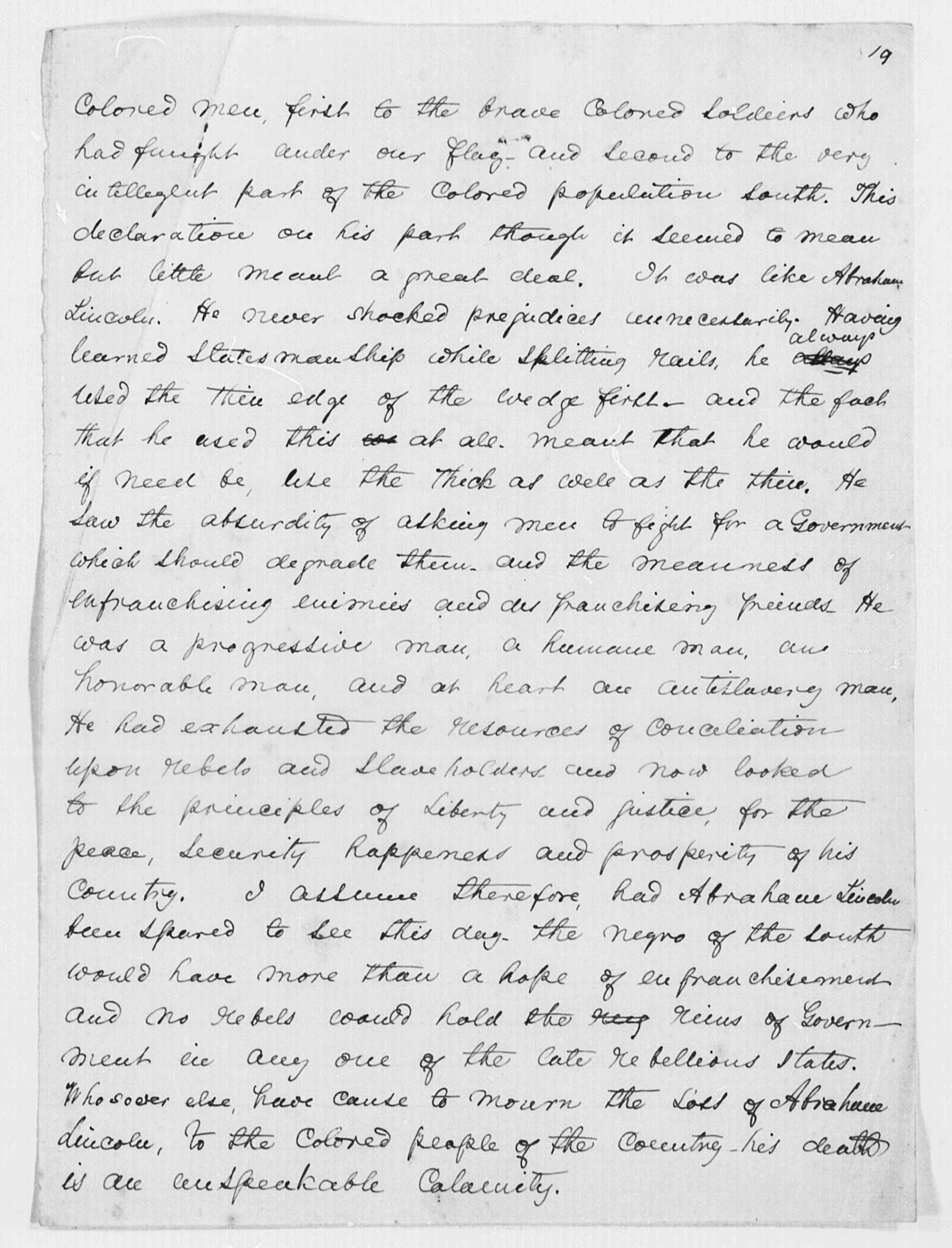
-
Description
In this speech, Frederick Douglass reflected on how the outpouring of joy at the conclusion of the Civil War turned to mourning with Lincoln’s assassination. His death, according to Douglass was not only tragic, but also prevented recently freed slaves and African Americans from gaining the ear of wise and well-intentioned leader. Towards the end of his speech, Douglass pondered how life would have been different had Lincoln not perished in April, lamenting that his death was a great blow against African American rights.
-
Source
Frederick Douglass Papers, Manuscript Division, Library of Congress
-
Rights
This item is in the public domain and may be reproduced and used for any purpose, including research, teaching, private study, publication, broadcast or commercial use, with proper citation and attribution.
-
Creator
Frederick Douglass
-
Date
December 15, 1865
from Sep. 28, 1865
"The Great Crimes of the 'Democracy'"
-
Full Title
"The Great Crimes of the 'Democracy'"
-
Description
This article details the wrongs committed by the Confederacy and the Democratic Party, including the assassination of Lincoln.
-
Rights
This item is in the public domain and may be reproduced and used for any purpose, including research, teaching, private study, publication, broadcast or commercial use, with proper citation and attribution.
-
Tags
-
Cite this Item
Beltmont Chronicle. ""The Great Crimes of the 'Democracy'"". Remembering Lincoln. Web. Accessed June 30, 2025. https://rememberinglincoln.fords.org/node/451
-
Creator
Beltmont Chronicle
-
Date
September 28, 1865
from Sep. 28, 1865
"The Great Crimes of the 'Democracy'"

-
Description
This article details the wrongs committed by the Confederacy and the Democratic Party, including the assassination of Lincoln.
-
Rights
This item is in the public domain and may be reproduced and used for any purpose, including research, teaching, private study, publication, broadcast or commercial use, with proper citation and attribution.
-
Creator
Beltmont Chronicle
-
Date
September 28, 1865
